Table of Contents
Get started with MyPerfectResume today!
- Build a resume on any device
- Pick an ATS-friendly template
- Tailor with AI copy suggestions
Why this resume works
- Highlights industry-specific skills: The resume underscores healthcare skills by detailing extensive experience in medication management, patient counseling, and drug utilization reviews within pharmacy settings.
- Quantifies accomplishments: Measurable accomplishments are clear through metrics like reducing waste by 20%, counseling over 30 patients daily, and achieving a 98% IV preparation accuracy rate.
- Showcases career progression: Career progression is evident from roles as a pharmacy technician to clinical pharmacist, highlighting increased responsibilities such as supervising interns and training new staff.
More Pharmacist Resume Examples
Check out our pharmacist resume examples to understand how to showcase your knowledge, patient care expertise, and precision. These samples will help you craft a pharmaceutical resume that appeals to healthcare employers.
Entry-level Pharmacist
Why this resume works
- Prominent education section: The education section is placed near the top of the resume to emphasize impressive credentials. When you’re early in your career, this is a good way to grab attention.
- Includes a resume objective: A resume objective is valuable for entry-level candidates just starting their career. It provides a clear introduction that communicates career goals and enthusiasm when you don’t have much work experience to speak for itself.
- Shows digital literacy: Computer skills are demonstrated through references to managing inventory control systems and implementing a new medication reconciliation process. This shows a readiness for modern workplace challenges.
Mid-level Pharmacist
Why this resume works
- Includes mix of soft and hard skills: The resume showcases a balanced skill set, highlighting both technical expertise in clinical pharmacology and essential interpersonal skills like patient counseling.
- Demonstrates language abilities: Language skills are clearly demonstrated, with proficiency in English, Spanish, and Mandarin, emphasizing the candidate’s capacity for cross-cultural communication.
- Displays technical expertise: Technical expertise is evident through specialized certifications in pharmacotherapy and diabetes education, alongside practical experience in medication therapy management and regulatory compliance.
Experienced Pharmacist
Why this resume works
- Lists relevant certifications: The resume lists certifications like BCPS and CDE, showcasing continued learning and expertise in specialized areas of pharmacy.
- Showcases impressive accomplishments: Significant achievements such as a 20% increase in patient satisfaction and $200K cost savings highlight the candidate’s impact at a senior level.
- Emphasizes leadership skills: Leadership skills are evident from managing substantial inventories and supervising pharmacy technicians, reflecting effective oversight and team management.
Pharmacist Resume Template (Text Version)
Daniel Rodriguez
Los Angeles, CA 90011
(555)555-5555
Daniel.Rodriguez@example.com
Professional Summary
Experienced pharmacist with expertise in medication management, patient counseling, and inventory control. Proven ability to improve medication safety and streamline pharmacy operations. Fluent in Spanish and English, with a strong commitment to patient care and community service.
Skills
- Medication management
- Patient counseling
- Pharmaceutical calculations
- Inventory control
- Prescription verification
- Anxiety medication
- IV preparation
- Insurance claims
Certifications
- Certified Diabetes Educator – National Certification Board for Diabetes Educators
- Immunization Certification – American Pharmacists Association
Education
Master’s Degree Pharmacy
University of Texas Austin, Texas
May 2019
Bachelor’s Degree Biology
Texas State University San Marcos, Texas
May 2017
Work History
Pharmacist
HealthFirst Pharmacy – Los Angeles, CA
March 2023 – March 2025
- Managed medication inventory, reducing waste by 20%.
- Provided medication counseling to 30+ patients daily.
- Conducted drug utilization reviews improving safety.
Clinical Pharmacist
WellCare Hospital – Riverside, CA
March 2021 – March 2023
- Reviewed physician orders for accuracy, supervising an intern.
- Prepared IV medications, ensuring 98% accuracy rate.
- Trained new pharmacy staff, enhancing team efficiency.
Pharmacy Technician
MediCare Pharmacy – San Francisco, CA
March 2019 – March 2021
- Assisted in dispensing prescriptions, reducing wait times.
- Managed patient medication profiles for safety.
- Completed insurance claims achieving 95% approval rate.
Languages
- English – Beginner (A1)
- Spanish – Beginner (A1)
- French – Intermediate (B1)
Popular Skills for a Pharmacist Resume
A skills section should include the range of skills needed for a pharmacist role. This position requires detailed medication knowledge along with excellent communication and customer service abilities for effective interactions with patients and healthcare professionals.
Below are a few of the top soft skills frequently listed on pharmacist resumes in our database.
| Soft Skills | % of resumes with this skill |
|---|---|
| Customer service | 54.22% |
| Safety awareness | 13.33% |
| Resolving complaints | 12.50% |
| Sales skills | 8.33% |
| Documentation skills | 6.67% |
Here are a few examples of hard skills frequently included on pharmacist resumes.
| Hard Skills | % of resumes with this skill |
|---|---|
| Medication dispensing | 42.19% |
| Prescription verification | 41.98% |
| Drug interactions knowledge | 25.00% |
| Patient education and counseling | 20.59% |
| Vaccination administration | 20.00% |
Related Resume Guides
Advice for Writing Your Pharmacist Resume
Not sure how to make a resume for a pharmacist job? No worries — we’ll walk you through it. Learn how to showcase your pharmaceutical knowledge, patient care skills, and commitment to top-quality healthcare in a way that grabs employers’ attention.
Highlight relevant certifications and training
Certifications and specialized training are essential for pharmacists. These credentials can distinguish you in a competitive field by illustrating your dedication to professional growth. Sometimes they’re required. To enhance visibility, consider placing a Certifications & Training section immediately after your Education section.
In this part of your resume, list any pharmacy-specific certifications such as:
- Board Certification in Pharmacotherapy (BCPS)
- Immunization Certification
- Medication Therapy Management (MTM) certification
- Certified Geriatric Pharmacist (CGP)
Be sure to include the certification name, issuing organization, and date obtained. By clearly organizing your certifications, you enable employers to quickly recognize your qualifications.
Here’s what a well-organized section looks like.
Example of a certifications section
Pharmacotherapy Specialist (BCPS)
Issued by: Board of Pharmacy Specialties
Expires 2024
Immunization Delivery Certification
Issued by: American Pharmacists Association (APhA)
Completed 2021
Certified Diabetes Educator (CDE)
Issued by: National Certification Board for Diabetes Educators
Issued 2023
Advanced Cardiovascular Life Support (ACLS) Certification
Issued by: American Heart Association
Expires 2025
Medication Therapy Management (MTM) Certification
Issued by: American Society of Health-System Pharmacists (ASHP)
Completed 2022
Looking at professional resume examples can help you see what works best and make your own resume stand out.
List your most relevant skills
For pharmacists, it’s crucial to showcase both technical and soft skills. Technical skills might include knowledge of medication management, pharmaceutical calculations, and proficiency with pharmacy software like Pyxis or Epic. Soft skills such as communication, problem-solving, and empathy are equally important because they help you interact effectively with patients and healthcare teams.
To make your resume stand out, create a dedicated Skills section that highlights these abilities. List your software proficiencies clearly and mention any extra talents that set you apart.
Additionally, weave your skills into your work experience bullet points. For example, “Utilized Pyxis software to manage inventory accurately” or “Communicated complex medical information to patients in an understandable way.” This approach not only showcases your expertise but also demonstrates how you’ve applied these skills in real-world scenarios.
Incorporate keywords from the job listing in your resume to pass ATS and catch the eye of recruiters.
Write a strong professional summary
A professional summary is a snapshot at the top of your resume that highlights your key skills and achievements. For an experienced pharmacist, this section should emphasize your years of experience, specialized knowledge, and major accomplishments in the field. This creates a strong first impression by quickly showing why you are an excellent fit for the role.
If you are an entry-level candidate with limited experience, use a resume objective instead. A resume objective highlights your career goals and how they match the company’s needs. Use dynamic language to highlight your skills and impact in related experiences or internships.
To complete this section effectively, list key skills prominently and organize it by highlighting major achievements or experiences that show your value as a pharmacist. Keep it concise but impactful to grab attention immediately.
Pharmacist resume summary examples
Entry-Level
Recent doctor of pharmacy (Pharm.D) graduate with a solid foundation in pharmacology, patient counseling, and medication therapy management. Certified Immunizer and proficient in pharmacy software systems such as EPIC and Meditech. Eager to contribute to a team-oriented pharmacy setting and provide high-quality pharmaceutical care to diverse patient populations.
Mid-career
Competent pharmacist with over 7 years of experience in both retail and hospital pharmacy environments. Demonstrated expertise in medication dispensing, drug utilization review, and patient education. Licensed pharmacist with certifications in Medication Therapy Management (MTM) and Anticoagulation Therapy Management. Known for strong problem-solving skills, accuracy, and dedication to patient safety.
Experienced
Seasoned clinical pharmacist with more than 15 years of experience leading pharmacy operations and clinical services. Expert in pharmacokinetics, oncology pharmacy, and chronic disease management. Board Certified Oncology Pharmacist (BCOP) with proven leadership in developing clinical protocols and conducting medication therapy management programs that improved patient outcomes by 20%. Committed to mentoring junior pharmacists and advancing the practice of pharmacy through continuous professional development.
Pharmacist resume objective examples
Recent graduate
Recent pharmacy graduate with a doctor of pharmacy (Pharm.D.) degree seeking an entry-level pharmacist position to utilize extensive knowledge in pharmacology and patient care. Eager to contribute to a reputable healthcare facility by providing exceptional pharmaceutical services and ensuring optimal patient outcomes.
Career changer
Dedicated healthcare professional transitioning into the field of pharmacy, bringing over five years of experience in patient care and medical knowledge. Seeking a pharmacist role where I can apply my robust clinical background, strong analytical skills, and passion for improving patient health through effective medication management.
Specialized training
Licensed pharmacist with specialized training in oncology pharmacy looking to join a leading cancer treatment center. Committed to applying advanced knowledge in chemotherapy protocols and supportive care medications to enhance therapeutic outcomes for patients battling cancer.
Want your pharmacist resume to stand out? Use our Resume Builder to get easy tips and a professional look in minutes.
Showcase your accomplishments and publications
Including your publications, conference presentations, and research achievements can significantly enhance your resume by showcasing your dedication to keeping up with the latest scientific progress. These details highlight your contributions to the profession and establish credibility in both clinical practice and academic research.
To create a Publications & Presentations section, list peer-reviewed articles, book chapters, and conference papers in an organized format.
Adhere to professional citation styles such as APA or MLA for referencing details (journal name, volume, issue, year). For instance: “Smith, J., & Doe, A. (2020). The impact of new drug therapies on patient outcomes. Journal of Clinical Pharmacy, 15(2), 123-130.”
Emphasize any major awards, grants, and fellowships that bolster your research credentials. If relevant, include links to online research profiles like Google Scholar or ORCID for convenient access to your complete body of work.
Choose a straightforward and clean resume template. Opt for clear section headers and legible fonts, steering clear of excessive embellishments to ensure your skills and experience stand out.
Salary Insights for Pharmacists
Top 10 highest-paying states for pharmacists (new data)
Pharmacists earn varying salaries across the United States, with a national average of $134,182. The table below highlights the states where pharmacists command the highest compensation.
Our salary information comes from the U.S. Bureau of Labor Statistics’ Occupational Employment and Wage Statistics survey. This official government data provides the most comprehensive and reliable salary information for writers across all 50 states and the District of Columbia. The figures presented here reflect the May 2025 dataset, which is the most recent available as of this publication.
| State | Average Salary |
|---|---|
| California | $162,110 |
| Alaska | $158,430 |
| Oregon | $156,160 |
| Washington | $154,860 |
| Minnesota | $147,880 |
| Hawaii | $147,650 |
| Wisconsin | $141,090 |
| New Hampshire | $140,440 |
| Delaware | $138,860 |
| Wyoming | $138,330 |
FAQ
Do I need to include a cover letter with my pharmacist resume?
Including a cover letter with your pharmacist resume can give you an advantage by highlighting why you’re specifically interested in the role and how your experience matches the employer’s needs. For example, if the pharmacy focuses on compounding or patient counseling, you can discuss your relevant skills and experiences. Using tools like our Cover Letter Generator can create a tailored cover letter.
A cover letter also allows you to showcase crucial communication skills for interacting with patients and healthcare professionals. By sharing specific examples of effective interactions, you add depth to your application that a resume alone can’t capture. If you need some guidance, consider reviewing cover letter examples for inspiration.
Creating a thoughtful cover letter shows your enthusiasm for the position and attention to detail — qualities every employer looks for.
How long should a pharmacist’s resume be?
A pharmacist’s resume length should ideally be kept to one page, particularly for those early in their career, ensuring clarity and ease of reading for hiring managers. For more experienced professionals with extensive backgrounds or specialized certifications, a two-page resume is acceptable.
Either way, concentrate on recent and relevant achievements like successful medication therapy management or patient counseling outcomes. Emphasize key skills such as medication safety and regulatory compliance to maximize.
How do you write a pharmacist resume with no experience?
When you’re writing a resume with no experience, a pharmacist should emphasize your education, skills, and any relevant training to prove you’re ready for the role.
Start by listing your pharmacy degree first, including the institution name, graduation date, and any honors. Mention certifications like your Pharmacy Technician Certification if applicable.
Detail any pharmacy internships or clinical rotations completed during your studies. Describe activities such as dispensing medications, patient counseling, or collaborating with healthcare teams during these experiences.
Highlight essential skills like medication management, customer service, attention to detail, and pharmacology knowledge. Include soft skills such as communication and teamwork.
Add relevant volunteer work where you provided pharmaceutical services or health advice at health fairs or community clinics.
This strategy will help show your readiness for a pharmacist position even without formal work experience.
Rate this article
Pharmacist
Share this page
Additional Resources
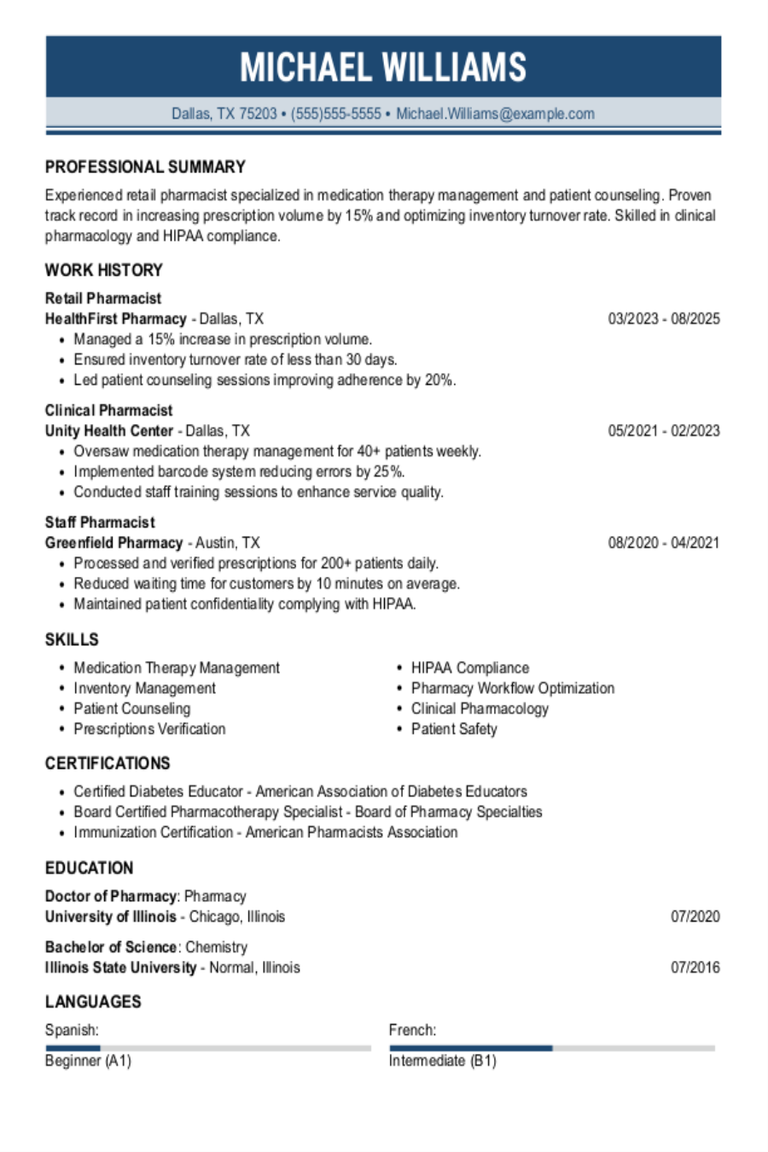
Retail Pharmacist Resume Examples & Templates
Browse retail pharmacist resume examples that show how to spotlight your customer service and medication management skills. Use these tips to clearly show your experience in helping customers and managing
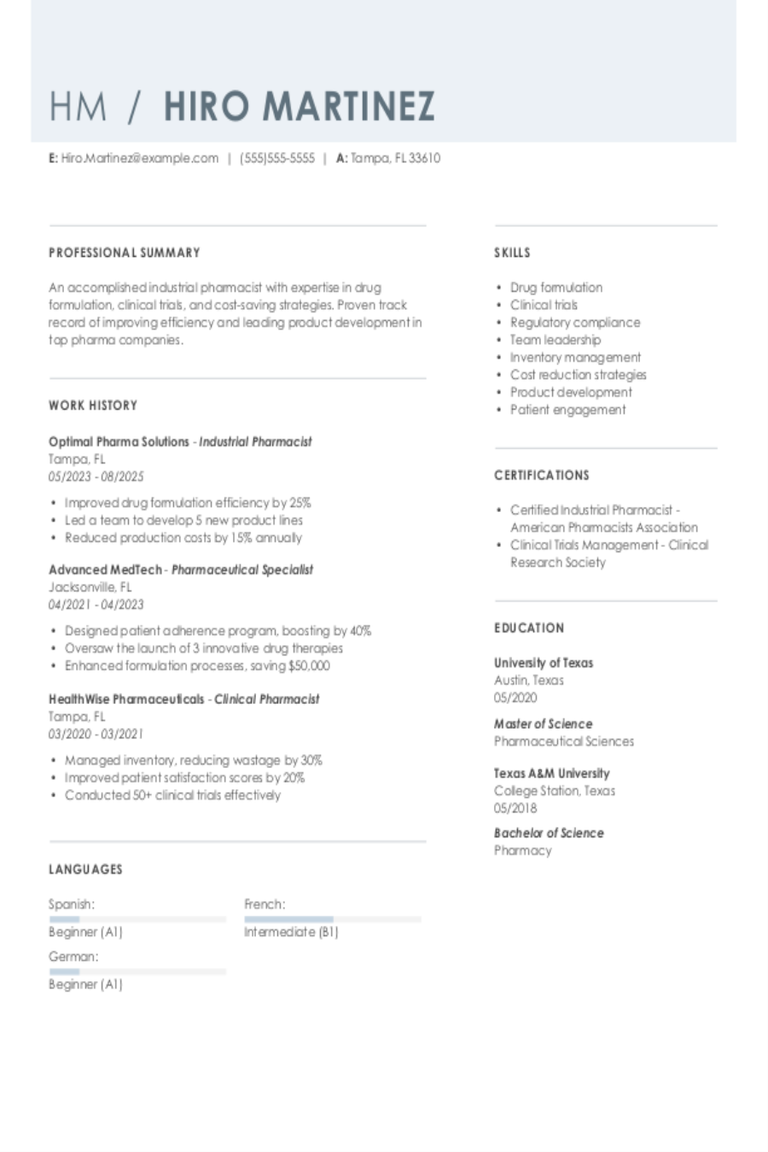
Industrial Pharmacist Resume Examples & Templates
Explore industrial pharmacist resume examples and find tips on highlighting key skills and experiences that make you stand out in the pharmaceutical industry.Build my resumeImport existing resumeCustomize this templateWhy this
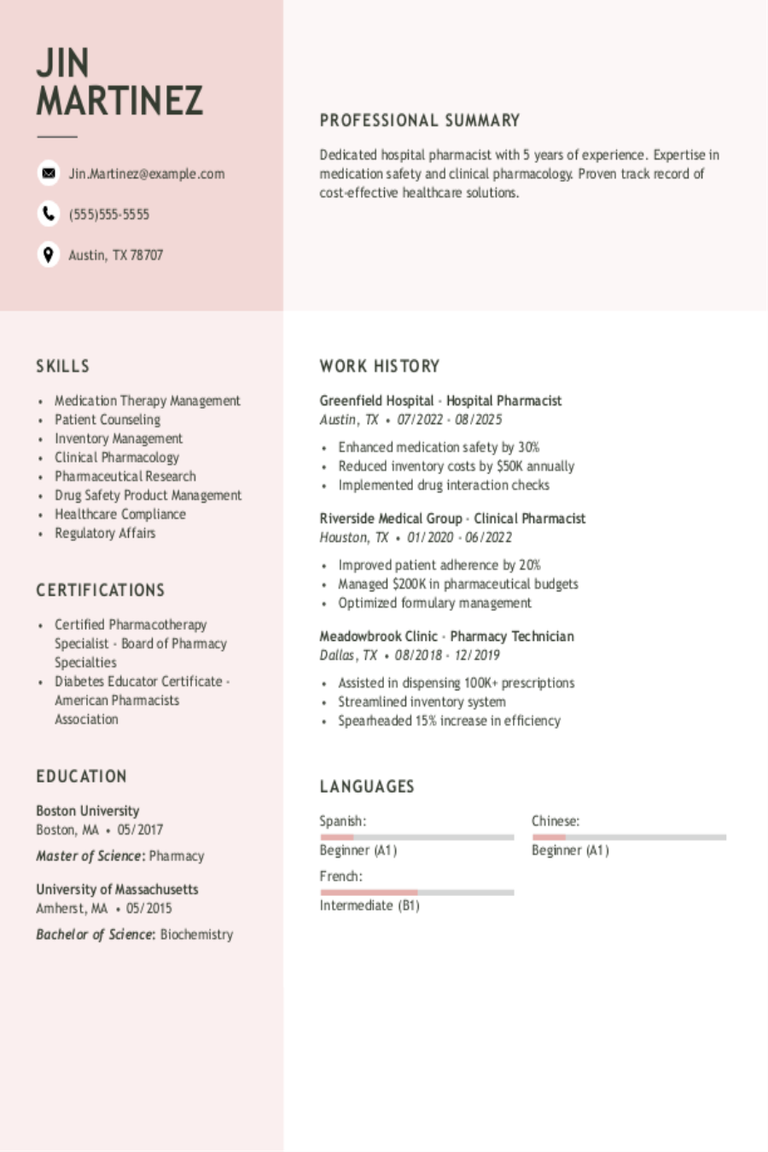
Hospital Pharmacist Resume Examples & Templates
Explore hospital pharmacist resume examples and learn how to show employers you're detail-oriented, knowledgeable about treatments, and ready to support healthcare teams.Build my resumeImport existing resumeCustomize this templateWhy this resume
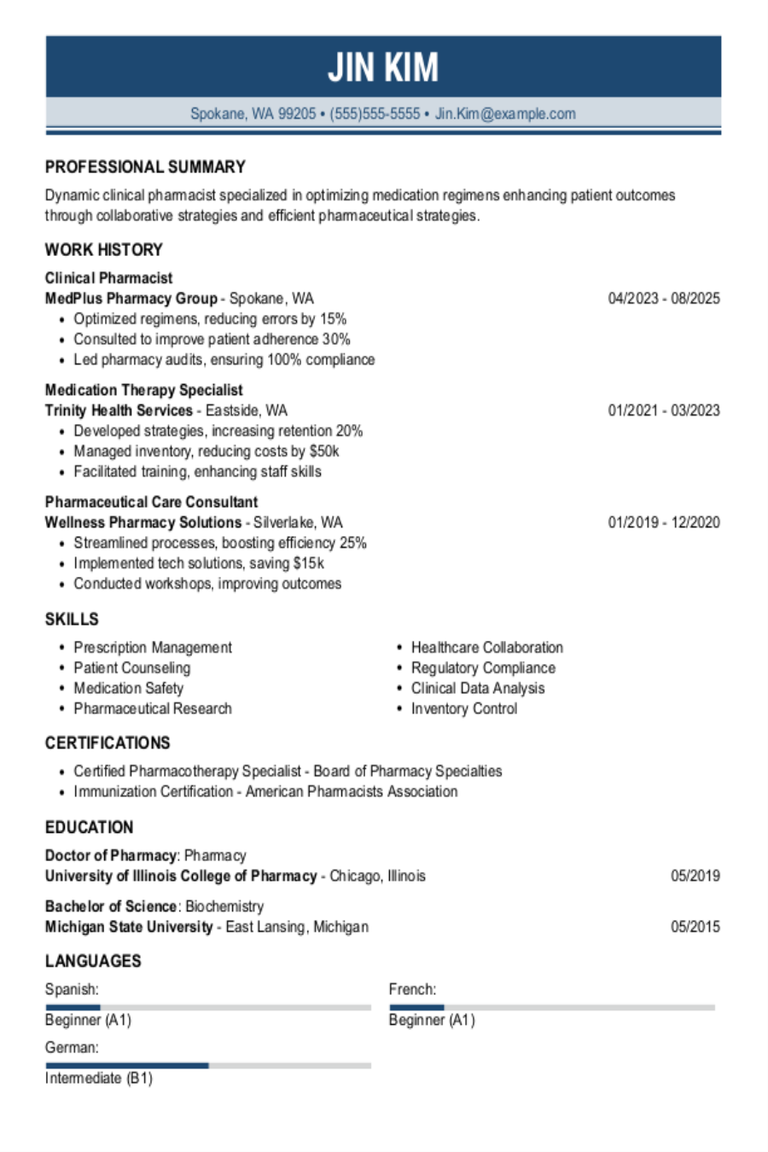
Clinical Pharmacist Resume Examples & Templates
Discover clinical pharmacist resume examples and learn how to showcase your patient care, medication management, and teamwork skills to stand out in the healthcare field.Build my resumeImport existing resumeCustomize this

The Illusion of Wage Growth: Where Paychecks Stretch the Farthest
U.S. wages have climbed at one of the fastest rates in modern history. Between 2020 and 2024, the average American worker’s pay rose from about $64,000 to $75,600, an 18%
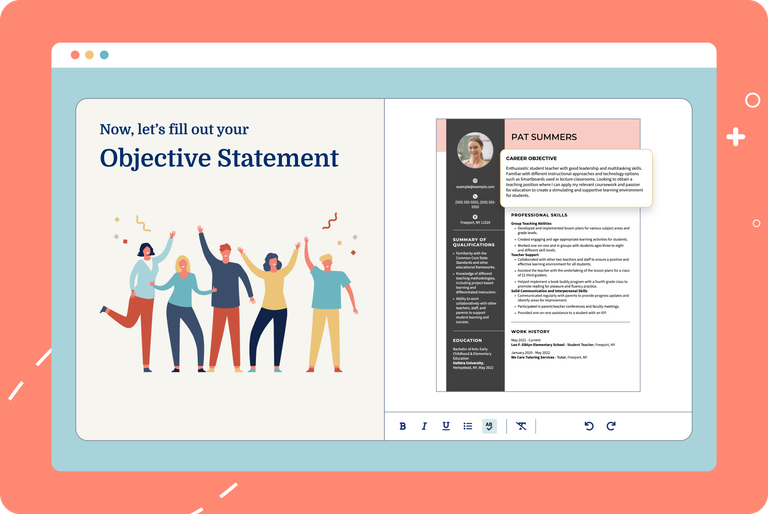
100+ Resume Objective Statement Examples & Best Practices
In just a sentence or two, a resume objective statement tells hiring managers the role or career path you’re aiming for and the unique skills and value you bring to
